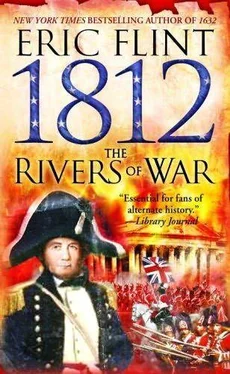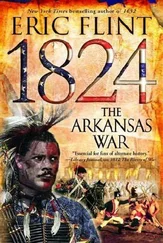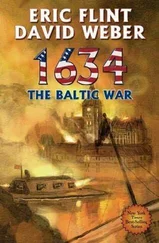Eric Flint - 1812 - The Rivers of War
Здесь есть возможность читать онлайн «Eric Flint - 1812 - The Rivers of War» весь текст электронной книги совершенно бесплатно (целиком полную версию без сокращений). В некоторых случаях можно слушать аудио, скачать через торрент в формате fb2 и присутствует краткое содержание. Жанр: Альтернативная история, на английском языке. Описание произведения, (предисловие) а так же отзывы посетителей доступны на портале библиотеки ЛибКат.
- Название:1812: The Rivers of War
- Автор:
- Жанр:
- Год:неизвестен
- ISBN:нет данных
- Рейтинг книги:4 / 5. Голосов: 1
-
Избранное:Добавить в избранное
- Отзывы:
-
Ваша оценка:
- 80
- 1
- 2
- 3
- 4
- 5
1812: The Rivers of War: краткое содержание, описание и аннотация
Предлагаем к чтению аннотацию, описание, краткое содержание или предисловие (зависит от того, что написал сам автор книги «1812: The Rivers of War»). Если вы не нашли необходимую информацию о книге — напишите в комментариях, мы постараемся отыскать её.
1812: The Rivers of War — читать онлайн бесплатно полную книгу (весь текст) целиком
Ниже представлен текст книги, разбитый по страницам. Система сохранения места последней прочитанной страницы, позволяет с удобством читать онлайн бесплатно книгу «1812: The Rivers of War», без необходимости каждый раз заново искать на чём Вы остановились. Поставьте закладку, и сможете в любой момент перейти на страницу, на которой закончили чтение.
Интервал:
Закладка:
Eric Flint
1812: The Rivers of War
American Characters
JOHN QUINCY ADAMS: U.S. negotiator at the peace talks with the British being held in the Belgian city of Ghent; son of John Adams, the second president of the United States.
JOHN A RMSTRONG: U.S. secretary of war.
CHARLES BALL: Freedman; U.S. Navy gunner.
JOSHUA BARNEY: Commodore, U.S. Navy.
JACOB BROWN: U.S. general in command of the Army of the Niagara.
JOHN COFFEE: A close friend and associate of Andrew Jackson, as well as his top subordinate officer.
HENRY CROWELL: Freedman; teamster, owning his own wagon.
PATRICK DRISCOL: Sergeant, U.S. Army.
SAM HOUSTON: Ensign in the Thirty-ninth U.S. Infantry; adopted son of the Cherokee chief John Jolly; his Cherokee name was Colonneh, which means "The Raven."
NDREW JACKSON: Commanding general of the Tennessee militia; later, major general in the regular U.S. Army, in command of U.S. forces in the southern theater in the War of 1812.
FRANCIS SCOTT KEY: Lawyer and poet.
MARIE LAVEAU: New Orleans voudou queen.
JAMES M ADISON: President of the United States.
ANTHONY MCPARLAND: Private, U.S. Army.
JAMES MONROE: U.S. secretary of state.
LEMUEL MONTGOMERY: Major in the Thirty-ninth U.S. infantry; personal friend of Andrew Jackson.
DAVID MORGAN: Brigadier general; commander of U.S. forces on the west bank of the Mississippi River in the New Orleans campaign.
DANIEL PATTERSON: Commodore, U.S. Navy; in command of American naval forces during the New Orleans campaign.
JOHN ENDLETON: Corporal in the Baltimore United Volunteers, a militia dragoon unit.
JOHN REID: Andrew Jackson's aide.
WINFIELD SCOTT: Brigadier general, U.S. Army; Brown's top subordinate officer.
W ILLIAMS SIMMONS: Accountant, formerly employed in the War Department.
W ILLIAM WINDER: Brigadier general, U.S. Army, in command of the defense of Washington, D.C.
Indian Characters
THE R IDGE: A major Cherokee chief; took the name Major Ridge after the battle of the Horseshoe Bend.
JAMES AND JOHN R OGERS: Tiana Ross's half brothers, nephews of chief John Jolly.
CAPTAIN JOHN R OGERS: Father of Tiana, James, and John; although a Scots-American, he was an informal member of the Cherokee tribe and adviser to John Jolly; his nickname was "Hell-Fire Jack."
TIANA R OGERS: Niece of Cherokee chief John Jolly.
JOHN ROSS: Young Cherokee leader; very influential in the tribe, although not a chief.
S EQUOYAH: Cherokee warrior; developer of the Cherokee written language.
N ANCY W ARD: Leader of the Cherokee women's council, holding the title of Ghighua, "War Woman" or "Beloved Woman."
WILLIAM WEATHERFORD: Principal war leader of the Red Stick faction of the Creeks during the Creek War; also known as Chief Red Eagle.
British Characters
SIR ALEXANDER COCHRANE: Vice admiral, in top command of Britain's operations against the U.S. south of Canada.
G EORGE C OCKBURN: Rear admiral, British navy.
SAMUEL G IBBS: Major general; Pakenham's top subordinate.
JAMES M ONEY: Captain, Royal Marines.
THOMAS M ULLINS: Lieutenant colonel; commander of the Forty-fourth Foot Regiment.
SIR EDWARD PAKENHAM: Major general; replaces Robert Ross as commander of British land forces in the New Orleans campaign.
ROBERT R ENNIE: Colonel; commander of the Forty-third Light Infantry.
PHINEAS R IALL: Major general, commander of British forces on the Niagara front.
ROBERT R OSS: Major general, commander of British army forces in the Chesapeake Bay campaign.
WILLIAM T HORNTON: Colonel, in command of the Eighty-fifth Foot Regiment.
PROLOGUE
Harrison's Mill
Logan County, Kentucky
The duel was to be held just across the state line in Kentucky. The government of Tennessee would enjoy the luxury of looking the other way. Although the illegal affair involved some of its more prominent citizens, their activities would be taking place outside its legal jurisdiction.
Kentucky would do the same, of course, simply because the perpetrators would be out of the state as soon as it was over. And they were all a bunch of cussed Tennesseans, anyway.
The first group was in high spirits as they made their way to the agreed-upon dueling ground.
"Twenty-four feet, you say?" asked Charles Dickinson, who was to be one of the principals in the duel. He said it with a smile on his face; as well he might, since it was a pointless question. He'd already asked it a dozen times that morning, and received the same answer every time.
Dickinson had finished reloading his pistol. He waved it toward a nearby tree. "That tree looks to be standing about eight paces away. Pick a leaf, gentlemen, if you would."
His companions-half a dozen of the "gay blades of Nashville," as the newspapers liked to call them-were feeling just as festive as Dickinson. After a short and energetic wrangle, they settled upon a particular and distinctive leaf.
No sooner had they done so than the pistol in Dickinson's hand came up, quickly and smoothly. The gun fired, and the leaf fluttered to the ground. Dickinson's shot had severed the stem.
By contrast, the mood of the other party was grim.
"You don't stand a chance against him," stated the principal's second, General Thomas Overton. "Dickinson's probably the best shot in the whole of Tennessee."
His companion, a fellow general of the Tennessee militia, nodded silently. The nod was somewhat on the jerky side, though the man showed no sign of nervousness. His bony head was perched atop a narrow neck, which connected it to a slender body that looked to be all bone and gristle.
"I'll have to take the first shot," he declared. "No point trying to beat Dickinson there."
Overton winced. "You may very well not survive that first shot," he observed bleakly.
The principal shrugged. "Oh, I think I'll be all right. Long enough, anyway. And I don't see where I've got any choice, anyhow. I said I'd kill the bastard, and I intend to be true to my word. Whatever it takes."
The surgeon who accompanied the two generals said nothing. He didn't even wince, although he'd be the one who'd have to keep the general alive afterward, if that was possible.
There was no point in wincing. A man might as well wince at the movement of the tides.
Once both parties had arrived at the dueling ground, the lots were drawn. Dickinson's second, Dr. Hanson Catlett, won the choice of position. Overton would have the count.
There was no point in delaying the affair. As soon as the principals had taken their positions, at the twenty-four-foot distance they'd agreed upon, Overton's voice rang out.
"Are you ready?"
"I am ready," Dickinson replied cheerfully.
"I am ready," came the stolid voice of his opponent.
"Fere!" cried Overton, pronouncing the word in his old-country accent.
Dickinson's pistol came up like a streaking lizard. The gun fired the instant it bore on the target.
The Tennessee general hadn't even lifted his firearm yet. A puff of dust rose from the breast of his coat. He staggered back a couple of paces, clenching his teeth. Slowly, he raised his left hand and pressed it to his chest.
But he never lost his grip on the pistol in his right hand.
Dickinson gaped, drawing back a step. "Great God!" he cried out. "Did I miss him?"
"Back to the mark, sir!" roared Overton. He raised his own pistol and aimed it at Dickinson. "Back to the mark, I say!"
Dickinson's face went blank. He stepped forward and resumed his position at the mark, his pistol now lowered to his side. He'd had his shot, and by custom, he had to wait his opponent's return.
Читать дальшеИнтервал:
Закладка:
Похожие книги на «1812: The Rivers of War»
Представляем Вашему вниманию похожие книги на «1812: The Rivers of War» списком для выбора. Мы отобрали схожую по названию и смыслу литературу в надежде предоставить читателям больше вариантов отыскать новые, интересные, ещё непрочитанные произведения.
Обсуждение, отзывы о книге «1812: The Rivers of War» и просто собственные мнения читателей. Оставьте ваши комментарии, напишите, что Вы думаете о произведении, его смысле или главных героях. Укажите что конкретно понравилось, а что нет, и почему Вы так считаете.











